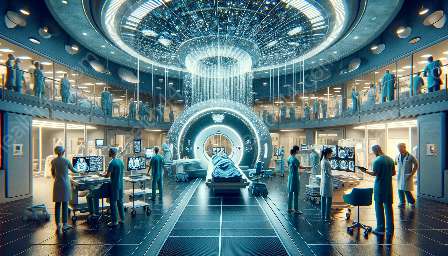Artificial intelligence (AI) has revolutionized many industries, and its impact on medical image analysis is particularly noteworthy. The use of AI in medical imaging has transformed the way healthcare professionals interpret and analyze images, leading to more accurate diagnoses and improved patient outcomes.
AI algorithms are designed to process large amounts of imaging data from various modalities, such as X-rays, CT scans, MRI, and ultrasound, to identify patterns, anomalies, and potential markers of disease. This has led to significant advancements in the diagnosis, treatment, and monitoring of various medical conditions.
The Role of AI in Medical Image Interpretation and Analysis
AI algorithms play a crucial role in medical image interpretation by enabling the automation of tasks that were traditionally performed by radiologists and other imaging specialists. These algorithms can rapidly analyze complex imaging data, detect abnormalities, and generate quantitative measurements, allowing healthcare professionals to make more informed decisions.
One of the key areas where AI has made a substantial impact is in the early detection and diagnosis of diseases. By analyzing medical images with high precision and accuracy, AI can help identify subtle abnormalities that might have been overlooked in traditional interpretations. This early detection can significantly improve patient outcomes and treatment efficacy.
Furthermore, AI-driven image analysis can contribute to personalized medicine by providing insights into individual patient characteristics and predictive markers. This enables healthcare providers to tailor treatment plans based on the unique attributes of each patient, leading to better clinical outcomes and reduced healthcare costs.
The Transformative Potential of AI in Medical Imaging
The integration of AI into medical image analysis has the potential to revolutionize healthcare delivery in several ways. AI algorithms can perform repetitive and time-consuming tasks with efficiency and accuracy, allowing healthcare professionals to focus on more complex decision-making and patient care. This can lead to improved workflow efficiency and reduced diagnostic errors.
Moreover, AI-based image analysis can facilitate the identification of treatment response and disease progression in real time, enabling timely interventions and adjustments to patient management. This not only improves patient outcomes but also enhances the overall quality of care.
Another significant benefit of AI in medical image analysis is the ability to standardize and enhance the consistency of image interpretation across different healthcare settings. By leveraging AI, healthcare organizations can establish standardized protocols for image analysis, leading to more uniform and reliable interpretations, particularly in multi-center studies and clinical trials.
Challenges and Considerations in AI-driven Medical Image Analysis
While the potential of AI in medical image analysis is immense, there are certain challenges and considerations that need to be addressed. One of the primary concerns is the need for robust validation and regulatory approval of AI algorithms to ensure their safety, efficacy, and generalizability across diverse patient populations and imaging platforms.
Additionally, ethical and legal considerations surrounding the use of AI in healthcare, particularly in image analysis, require careful attention. Issues related to patient privacy, data security, and the responsible use of AI-generated insights need to be carefully managed to maintain trust and integrity in healthcare practices.
Furthermore, the integration of AI into existing healthcare systems requires comprehensive training and education for healthcare professionals to effectively utilize AI-driven image analysis tools. This necessitates investments in workforce development and continuous learning to ensure the responsible and proficient use of AI in medical imaging.
The Future of AI in Medical Image Analysis
Looking ahead, the future of AI in medical image analysis is marked by ongoing advancements in algorithm development, data integration, and collaborative research efforts. The continued refinement of AI algorithms, coupled with enhanced computational capabilities and deep learning techniques, holds promise for further improving the accuracy, sensitivity, and specificity of medical image analysis.
Moreover, the integration of AI with other emerging technologies, such as augmented reality and virtual reality, could further enhance the interpretation and visualization of medical images, providing healthcare professionals with immersive and interactive tools for diagnosis and treatment planning.
As AI continues to evolve, its integration into medical image analysis will likely expand beyond diagnostic applications to include prognostic and therapeutic decision support, ultimately reshaping the landscape of healthcare delivery and fostering personalized, data-driven medicine.



